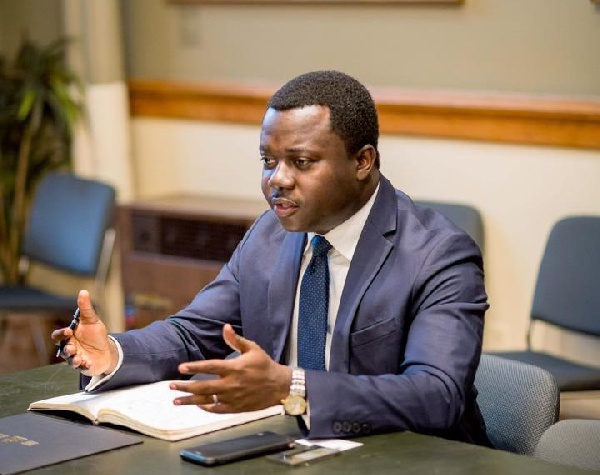The Member of Parliament of Assin South, John Ntim Fordjour, has asked the government of Ghana to ensure the protection of the rights of Ghanaians affected by U.S. immigration policies.
Reading a statement on the floor of Parliament on Friday, February 21, 2025, the MP raised concerns over what he described as the violation of the human rights of some Ghanaians who are being deported from the U.S. as a result of a recent crackdown on illegal immigration.
“Mr. Speaker, what is most distressing about these deportations is not only their scale but the inhumane treatment our citizens endure at U.S. detention centers before their forced removal. Stories in news reports paint a grim picture of our fellow citizens subjected to degrading conditions: overcrowded and unsanitary holding facilities, shackles on their hands and feet, denial of legal representation, physical and verbal abuse, lack of medical care, and, in many cases, outright violations of their fundamental human rights.
“Mr. Speaker, these Ghanaians, though facing deportation for various reasons, remain our brothers and sisters. We simply cannot turn a blind eye to their suffering,” he stated.
He called on the government of Ghana to leverage diplomacy to ensure more humane and appropriate treatment of Ghanaians affected by the crackdown.
“Mr. Speaker, the question before this House and the government is: What immediate diplomatic measures are being taken to ensure that the human rights of Ghanaian immigrants in the United States are protected? Our citizens deserve fair treatment, and it is imperative that our government demands accountability from U.S. authorities regarding the treatment of deportees before their return. I urge the government, through the Ministry of Foreign Affairs, to strengthen its diplomatic engagements to negotiate humane and appropriate deportation processes and ensure that the basic human rights of our dear citizens are not trampled upon,” he said.
John Ntim Fordjour, who is also a former Deputy Minister of Education, raised the matter of reintegration for deportees, emphasising the need for the government to put in place measures to help them resettle back into Ghanaian society.
“Furthermore, Mr. Speaker, we must address the urgent issue of reintegration. Many deportees arrive in Ghana with no resources, no jobs, and no clear path forward. Some have spent most of their lives in the U.S. and will struggle to integrate back into Ghanaian society without support.
“It is, therefore, crucial that the government, through the Ministry of Labour, Jobs and Employment, establish structured reintegration programs, including job placement initiatives, skills training, and mental health and psychosocial support for returnees. We must ensure that they are not left to suffer in silence,” he said.
He continued that, “Mr. Speaker, due to economic hardships at home, many of our citizens have undertaken high-risk and precarious migration in search of better opportunities abroad. Therefore, addressing unemployment and expanding economic prospects are crucial in curbing the number of Ghanaians turning to irregular migration.
“Government institutions, particularly the Youth Employment Agency, must take decisive action to combat unemployment by creating sustainable job opportunities and offering skills development programs. Even more productive would be for the government to support and incentivize the private sector to create more jobs for the youth.”
He stressed the need for Ghanaian embassies to live up to their mandate while calling on the government to protect the dignity and rights of every Ghanaian living abroad, including those impacted by U.S. immigration laws.
“Finally, Mr. Speaker, I propose that the government instruct our embassies in the U.S. to fast-track passport processing for undocumented Ghanaian immigrants who wish to regularize their status or make informed decisions about their future before deportation becomes their only option. A proactive approach could prevent further suffering and allow those affected to navigate their immigration challenges with dignity.
“Now, more than ever, it is imperative for the Ministry of Foreign Affairs to lead the charge with alacrity in providing extensive consular services for Ghanaians living abroad, especially in the U.S.A., while deepening bilateral engagement with the U.S. in relation to modalities of deportation,” he stated.
In recent months, Ghanaians in the United States have faced increased scrutiny due to a broader immigration crackdown under the Donald Trump administration, which took office in January 2025. This policy shift has prioritised the enforcement of immigration laws, targeting undocumented immigrants and those with final removal orders.
According to data from the U.S. Immigration and Customs Enforcement (ICE), as of November 24, 2024, approximately 3,228 Ghanaians were listed on ICE’s non-detained docket with final orders of removal, placing them at risk of deportation. This figure is part of a larger group of 1.4 million non-citizens identified for removal nationwide.
Between 2021 and 2024, ICE arrested 464 Ghanaians, with 23 detained for criminal convictions and the remainder for other immigration violations.
Deportation efforts intensified in early 2025, with 258 Ghanaians deported over the past four years and an additional 156 reported as processed for imminent deportation as of February 8, 2025, according to Ghana’s Minister of Foreign Affairs, Samuel Okudzeto Ablakwa.
Meanwhile, watch Ketu North MP speak on vetting committee chaos and appointment revocations:
GA/AE
